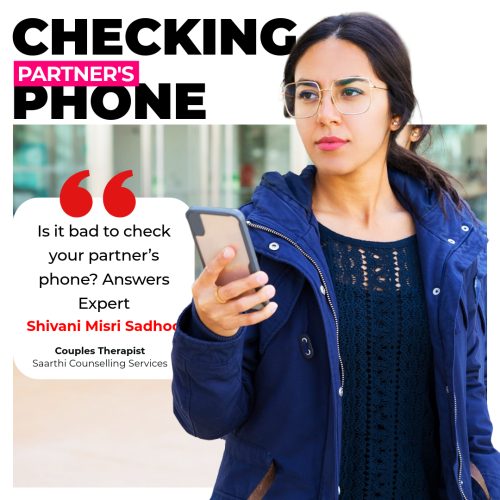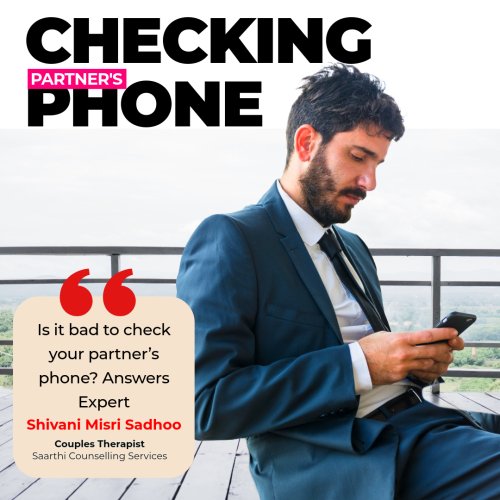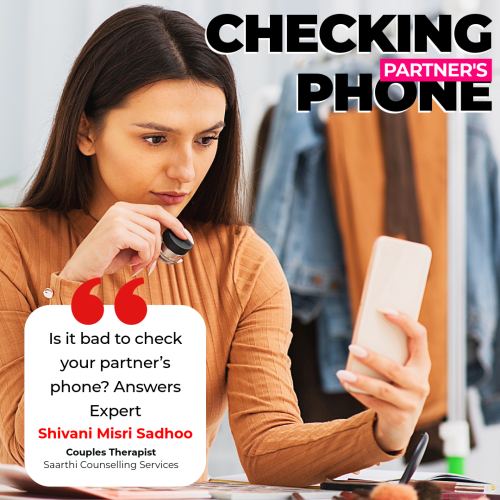Is it Bad to Check Your Partner’s Phone? Answers Expert
In today’s hyper-connected digital age, mobile phones have become personal vaults of communication, memories, and daily routines. Within relationships, this can create tension—especially when one partner feels tempted to check the other’s phone. From a couples therapy standpoint, this behaviour is not just about curiosity or suspicion—it often reflects deeper issues such as insecurity, boundary confusion, or a lack of emotional trust. Understanding the dynamics behind this urge is crucial for nurturing healthy, respectful relationships.
Is it bad to check your partner’s phone or not?
Shivani Misri Sadhoo, leading relationship expert and one of the best marriage counsellors in India, shares her views on the topic.
Trust Is the Cornerstone of Intimacy
Relationship therapists consistently highlight that trust forms the foundation of emotional safety between partners. When one partner checks the other’s phone without consent, it may signal a breakdown of that trust. Such actions are less about finding concrete evidence and more about addressing emotional uncertainty or fear of betrayal. Without rebuilding trust through open dialogue, phone-checking can erode the sense of security in the relationship.
Privacy Does Not Equal Deception
Therapeutic models of healthy relationships recognise the importance of individual boundaries, even within close emotional bonds. Each partner is entitled to a sense of personal space—digital or otherwise. Privacy in this context is not synonymous with secrecy; rather, it is a sign of respect for individuality. When partners respect each other’s boundaries, it fosters mutual confidence and emotional maturity.
The Behavior Often Escalates Conflict
Research and clinical observations show that covertly accessing a partner’s phone can create more harm than resolution. Misinterpretations of messages, lack of context, or unexpressed emotions often lead to defensiveness, accusations, and emotional withdrawal. Over time, repeated violations of privacy can create a pattern of distrust, making conflict resolution more difficult and damaging relational stability.
Underlying Issues Must Be Addressed, Not Avoided
Phone-checking is rarely the core problem—it is typically a symptom of deeper relational concerns such as past infidelity, emotional disconnect, or fear of abandonment. Therapy focuses on identifying these root causes and facilitating honest communication. Without addressing these underlying issues, the urge to monitor a partner’s digital behaviour may persist, perpetuating a cycle of mistrust and anxiety.
Open Communication Is the Healthier Alternative
Rather than resorting to surveillance, couples are encouraged to engage in transparent, non-confrontational conversations about their concerns. When both partners feel heard and understood, the need for secretive behaviour diminishes. Establishing shared boundaries, clarifying expectations around digital privacy, and rebuilding emotional trust are all essential steps supported by relationship therapy frameworks.
Checking a partner’s phone without consent is rarely a sign of a healthy relationship. While the impulse may stem from genuine fear or hurt, the act itself often causes greater harm. From a therapeutic perspective, the path to stronger relationships lies not in silent monitoring but in open-hearted communication, emotional safety, and mutual respect for boundaries.
- Are You an Echoist? How It Differs from People-Pleasing - February 27, 2026
- What Is “Friendfluence,” One of the Top Dating Trends of 2026? - February 23, 2026
- Why Chocolate is the Ultimate Symbol of Love? Answers Expert - February 13, 2026



